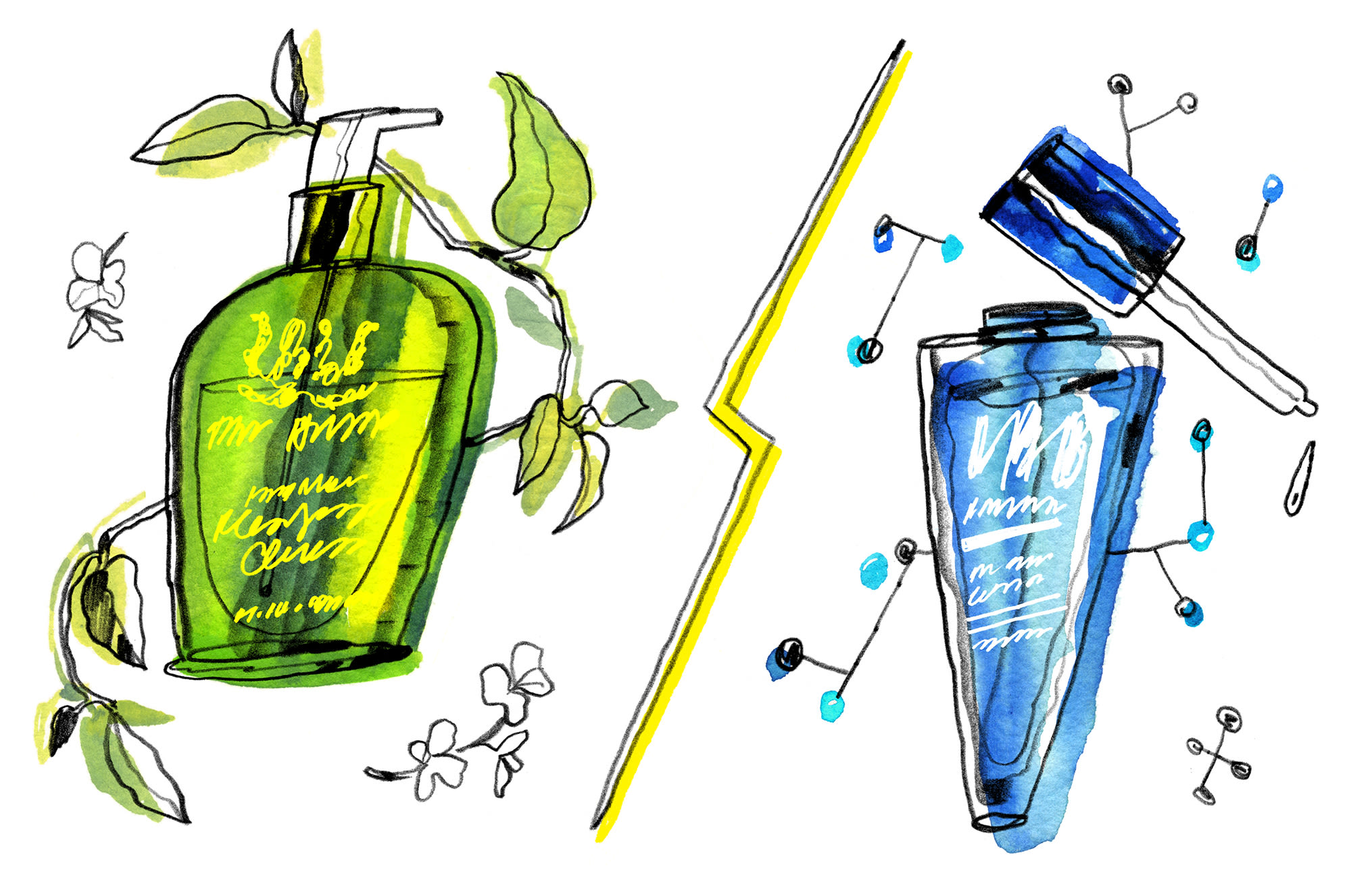Forgive me, fellow green beauty believers, for I have sinned. It has been two months since I abandoned my organic skincare and makeup routine. In its place now are prescription creams, pills, and the drugstore face washes and sunscreens I once swore off. My face has cleared up, but the guilt has not.
It all started with the Breakout From Hell—the worst in my 10-year battle with acne. An irritating colony of whiteheads settled on my chin and cheeks. The pain physically stung and spread even deeper, to my self-esteem. I avoided leaving my house. I exacerbated the condition by caking on concealer and foundation. When the time came to consult a dermatologist—the third in my history—I encountered a dilemma. Following the doctor's orders meant compromising the natural beauty routine I followed religiously. Desperate to see results, I stashed away my plant-based solutions and started prescriptions for clindamycin lotion, tretinoin cream, spironolactone pills and suggested Clean & Clear Continuous Control Acne Cleanser, CeraVe Skin Renewing Night Cream, Cetaphil Gentle Cleansing Bar and Neutrogena Clear Face Liquid-Lotion Sunblock. Not an Ecocert, USDA, Campaign for Safe Cosmetics, nor other green stamp of approval was in sight.
I stopped seeing dermatologist more than a year ago, after I overhauled my entire beauty collection to exclusively include organic products. My epiphany happened while writing an article that led me to research what hundreds of mystery ingredients lurked in my daily routine. Horrified, I traded in everything from eye cream to red lipstick for green alternatives. I fell in love with brands like RMS, S.W. Basics, Tata Harper, Amala, and Juice Beauty and started frequenting natural e-tailers like Spirit Beauty Lounge. I was beyond a proud convert—I assumed the role of self-righteous ambassador. I took any opportunity tell my girlfriends and family about the potential harm hidden in their beloved beauty products. I scrutinized labels. I rejected or passed along any offers of makeup and skincare containing alarming ingredients I couldn't pronounce.
My skin benefited, going from hosting zit armies to lone blemishes once in a while. The most rewarding part of my new routine, however, was feeling like I joined a community. I bonded with other women at cocktail parties and grocery lines over recommendations, followed countless organic beauty Instagrammers, found heroes in cancer survivors-turned-skincare-entrepreneurs, and praised efforts of bloggers, like those behind BeautyLiesTruth, calling out the loosely regulated US beauty industry. When others dismissed my preference as a bunch of BS, I felt encouragement and comfort in this beauty circle. As soon as I stopped practicing what I preached, however, I felt like I was excommunicating myself from this green ethos.
It is difficult to admit that letting go of my strictly-natural policy actually worked. The pesky whiteheads disappeared. My chin and jaw—the most troubled areas—were smoother than I had ever seen. Scars faded. I could finally go makeup-free again.
That being said, I do hope to return to the green-fold eventually. I started to wonder how I could reconcile my skin's need for medical solutions and my love for natural products. I consulted Beth McLellan, M.D., director of Oncodermatology at Montefiore Health System and dermatologist for the app Spruce, and asked her my big question: Did I have to break up with green beauty products forever?
She explained that it all comes down to comfort level and finding the right dermatologist. You have to communicate your goals and forge a partnership with your provider that allows you to pursue preferences like organic products. It is worth maintaining a regimen for the suggested three to four months to see full results, and from that point Dr. McLellan said you can take baby steps to taper dosage and rely less on prescriptions to control acne. “Like you, we don't want you to be on unnecessary medication either,” she told me.
It was refreshing to learn Dr. McLellan totally understood my point of view. “Personally, I'm someone who is very natural and organic-minded. I eat organic food, but I use tretinoin,” she said. “I do not believe that putting something in my body is the same as putting something on the surface of my skin,” She went on to explain that one thing people don't recognize when writing off non-organic products is that one of the skin's main functions is to keep toxins out of the body and it is very effective at doing so. “If we could put something on the surface of the skin and it was all absorbed into the bloodstream, you would never have to take pills—you could just rub medicine on your skin, but it doesn't work that way,” she reasoned. “We do not have data showing any harmful long-term effects with many medications we prescribe. And for those with potential risks, we warn patients and limit their use to short periods of time.”
While speaking about balance with Dr. McLellan, it dawned on me: A beauty regimen is less like a religion and more like a relationship. It needs to be flexible and evolve with my skin's needs as it fluctuates with nature and life changes. Whatever pangs of guilt and betrayal I felt were self-inflicted—the only rules and judgments that exist are the ones I create. Finally, like a relationship, there can always be a reunion.
—Kristina Rodulfo
Illustration by Lauren Tamaki. For more on green beauty check out the 32 best natural skincare products out now.

